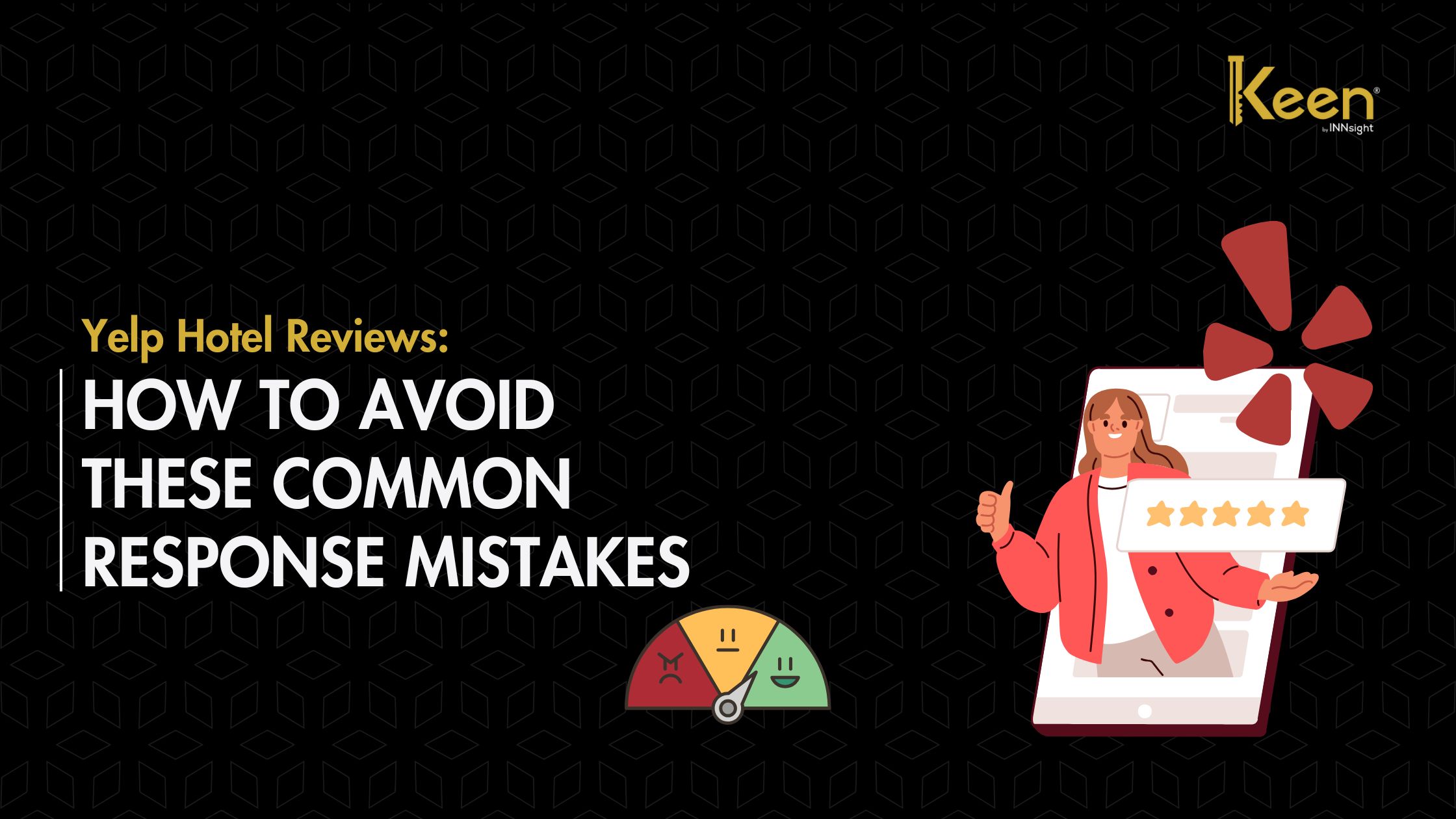Summary
In the digital age, hotel review monitoring is vital for reputation management. This comprehensive guide highlights effective strategies to track, respond to, and utilize guest feedback, enhancing a hotel's visibility, attracting new guests, and ensuring improved guest satisfaction. Embrace these practices to succeed in the competitive hospitality industry.
In today's digital age, online reviews play a significant role in the decision-making process for travelers.
According to a study by TripAdvisor, 80% of travelers say that online reviews impact their booking decisions.
Review monitoring is essential for hotels that want to protect their reputation and attract new guests.
This blog post will discuss the importance of hotel review monitoring and how to do it effectively.
Importance of Hotel Review Monitoring

The importance of hotel online review monitoring cannot be overstated. In today's digital age, where online reviews play a significant role in the decision-making process for travelers, it is essential for hotels to monitor and respond to reviews to protect their reputation and attract new guests.
Hotel review tracking is crucial for getting a complete picture of guest sentiment, and a reliable hotel review tracker can provide real-time guest feedback for hotels.
Here are some benefits of hotel review monitoring:
Increased Visibility and Bookings:
Positive reviews can help increase a hotel's visibility and attract new guests. According to a study by TripAdvisor, 80% of travelers say that online reviews impact their booking decisions.
This is where effective hotel review tracking comes in. A good hotel review tracker can ensure you’re on top of all this, providing real-time guest feedback for hotels that can influence bookings.
Improved Guest Satisfaction:
Hotels can identify areas to improve the guest experience by monitoring and analyzing reviews. This can lead to increased guest satisfaction and repeat bookings.
Reputation Management:
Negative reviews can damage a hotel's reputation and deter potential guests. By responding to negative reviews promptly and professionally, hotels can mitigate the damage and turn a negative experience into a positive one.
Feedback:
Online reviews can provide valuable feedback from guests that can help hotels to improve their products and services. This feedback can be used to identify areas for improvement and make changes that will make guests happier.
Utilizing Online Travel Agencies (OTAs) for Review Tracking

Online travel agencies (OTAs) are a great way to reach potential guests and gain bookings. They also offer a wealth of data about a hotel, including reviews from guests.
By monitoring reviews on OTAs, you can get valuable insights into how your hotel is performing and where you can improve. This includes hotel review tracking to keep an eye on all the data.
Benefits of Monitoring Reviews on OTAs
- Positive reviews can help increase a hotel's visibility and attract new guests. Using a hotel review tracker ensures these reviews get noticed.
- By monitoring and analyzing reviews on OTAs, hotels can identify areas where they can improve the guest experience. This can lead to increased guest satisfaction and repeat bookings.
- Negative reviews on OTAs can damage a hotel's reputation and deter potential guests. By responding to negative reviews promptly and professionally, hotels can mitigate the damage and turn a negative experience into a positive one.
- By comparing your hotel's reviews to those of other hotels on OTAs, you can better understand how your hotel is performing and where you need to improve.
- By tracking reviews over time, you can identify trends in guest feedback. This can help you anticipate changes in guest expectations and ensure that your hotel always meets those expectations.
Tips for Efficiently Tracking Reviews on OTAs
-
Set up alerts:
Set up alerts so that you are notified when new reviews are posted. This will help you stay on top of reviews and respond promptly.
-
Track reviews across multiple platforms:
Not all guests leave reviews on the same platform. Track reviews across platforms like TripAdvisor, Google, Booking.com, Expedia, Facebook, and more.
-
Use a review management system:
A reputation management system like KEEN can help you automate tracking and responding to reviews. This automates your hotel review tracking to compile real-time guest feedback for hotels.
-
Respond to reviews:
Respond to all positive and negative reviews. This shows that you care about your guests and are committed to providing excellent service.
-
Track your progress:
Track your progress over time to see how your hotel's reviews are improving.
-
Be proactive:
Don't wait for guests to leave reviews to reach out to them. Send them thank-you notes or ask for feedback after their stay.
Best Practices for Effective Hotel Review Monitoring
.jpg)
Develop a Review Response Strategy
- Set clear goals. What do you hope to achieve by responding to reviews? Do you want to improve your hotel's reputation, generate more bookings, or simply thank guests for their feedback? Once you know your goals, you can tailor your response strategy accordingly.
- Be timely. Respond to reviews promptly, preferably within 24 hours. This shows guests that you are taking their feedback seriously.
- Be professional. When responding to reviews, be professional and respectful, even if the review is negative. Avoid making personal attacks or getting defensive.
- Be specific. When responding to reviews, be specific about what you are doing to address the guest's concerns. This shows guests that you are taking action to improve their experience.
- Be positive. Even if the review is negative, try to end your response positively. This shows guests that you are committed to providing excellent service.
For a complete guide click here to get 12 Hotel Reputation Management Tips, read this blog.
Analyzing Trends and Identifying Improvement Opportunities
Analyzing trends and identifying improvement opportunities in reputation management for hotels is an important part of ensuring that your hotel is well-received by guests.
Tracking trends lets you see what is working well and what needs improvement. This information can then be used to make changes that will improve your hotel's reputation.
Previous Performance Data
This data shows how your hotel's reputation has improved over time. You can then look for trends in this data. For example, you might see that your hotel's reputation has been improving steadily over the past few months.
This would indicate that your reputation management efforts are working and that you are on the right track.
Competitor Analysis
Another way to analyze trends and identify improvement opportunities is to look at your competitors. How are their reputations? What are they doing that you are not? Understanding your competitors lets you see where to improve your hotel's reputation.
Here are some tips for analyzing trends and identifying improvement opportunities in reputation management for hotels:
- Use a variety of data sources. Don't just rely on your historical data. Look at other data sources, such as customer surveys and competitor analysis.
- Use data visualization tools. Data visualization tools can help you to see trends in your data more easily. This can make it easier to identify improvement opportunities. Hotel review trackers come with this kind of feature, especially when presenting real-time guest feedback for hotels.
- Be open to change. If something is not working well, be willing to make changes. Don't be afraid to experiment with new ideas.
- Track your progress. Once you make changes, track your progress to see if they are effective. This will help you to determine what changes are working and what changes need to be made.
Spotting Patterns in Guest Feedback
Spotting patterns in guest feedback is an important part of improving your hotel's customer experience.
By identifying the common themes and concerns in your guests' feedback, you can change your hotel to address their needs and improve their satisfaction.
There are several different ways to spot patterns in guest feedback. One way is to read through the feedback and look for common themes simply.
For example, you might see that several guests have complained about the noise level in your hotel.
This would indicate that you need to reduce the noise level, such as soundproofing the rooms or installing quieter air conditioners.
Another way to spot patterns in guest feedback is to use a data analysis tool. These tools can help you to identify common words and phrases in your feedback, as well as the sentiment of the feedback (positive, negative, or neutral).
- Neutral complaints: Do you see any common complaints in your feedback? If so, these are areas where you need to focus your efforts to improve your guest experience.
- Positive feedback: What are your guests saying that you're doing well? This information can help you to identify what you're doing right and continue to do it.
- Negative feedback: What are your guests saying that you could improve? This information can help you identify areas where you need to make changes to improve your guest experience.
|
This information can help you identify the most important issues your guests face and prioritize your efforts to address them.
Engaging with Guests and Encouraging Reviews
.jpg)
By engaging with guests and getting their feedback, hotels can identify areas where they can improve the guest experience. This could include things like the rooms' cleanliness, the food quality, or the level of customer service.
Encouraging Guest Reviews on Multiple Platforms
- Ask for reviews at the right time. Don't ask for reviews too soon after guests have checked out, as they may not have had enough time to reflect on their stay. However, don't wait too long either, as guests may forget about their stay or be less likely to leave a review if they have to dig out their paperwork.
- Make it easy for guests to leave reviews. Provide guests with a link to the review site of your choice or a QR code that they can scan with their phone.
- Offer incentives for leaving reviews. This could be anything from a small discount on their next stay to a gift.
- Respond to reviews promptly. If a guest leaves a review, be sure to respond promptly. This shows that you value their feedback and are taking steps to improve the guest experience.
- Track your reviews. Keep track of the reviews that you receive and make sure that you are responding to them promptly. You can also use this information to identify areas to improve the guest experience.
- Personalize your requests for reviews. Address guests by name and mention something you appreciated about their stay.
- Be respectful of guests' time. Don't ask for reviews too often or in an intrusive way.
- Thank guests for their reviews. Let guests know that you appreciate their feedback and will use it to improve the guest experience.
Responding to Reviews to Foster Guest Engagement
- Be punctual. Respond to reviews as soon as possible. This shows that you take the feedback seriously and are eager to address guests' concerns.
- Be personal. Address the reviewer by name and mention something specific about their stay that you appreciated. This will show that you have read their review and are taking their feedback to heart.
- Be respectful. Even if the review is negative, be respectful of the reviewer. Avoid making personal attacks or using inflammatory language.
- Be helpful. If the reviewer has a specific concern, offer to help resolve the issue. This could involve offering a refund, providing a free amenity, or apologizing for the inconvenience.
- Be positive. Even if the review is negative, try to end your response positively. This shows you are committed to improving your hotel and grateful for the reviewer's feedback.
Leveraging Analytics and Data for Better Insights

Analyzing reviews is a great way to identify areas for improvement in your hotel. By paying attention to guests' feedback, you can learn what they like and dislike about your property.
Analyzing Review Metrics and Ratings
Analyzing review metrics and ratings for hotels can be a valuable way to understand how guests are experiencing your property and identify areas where you can improve.
Here are some of the key metrics you should consider:
- HOTEL OVERALL PERFORMANCE SUMMARY
- AVERAGE REVIEW SCORE TREND - Review summary for the preceding year for various OTA platforms
- REVIEWS BREAKDOWNS - Rate of reviews received across various OTA platforms
- REVIEW CHANNELS SUMMARY - the total number of reviews received on various OTA platforms
- REVIEWS FREQUENCY - the overall tone of the reviews received
- CHANNEL DETAILS - average rating, the total number of reviews received, the total number of positive, neutral, and negative reviews received, and their proportion on each OTA site
- ELEMENT ANALYSIS - reviews for several elements such as comfort, location, cleanliness, value, service, and guest rooms
Identifying Areas for Improvement
Here are some specific areas for improvement that you can identify after analyzing reviews:
- Cleanliness: This is one of the most important factors that guests consider when choosing a hotel. If your hotel is not clean, guests will be less likely to stay there again.
- Staff: The staff is the face of your hotel, so it's important to ensure they are friendly, helpful, and knowledgeable.
- Amenities: The amenities you offer can make a big difference in the guest experience. Ensure you have the amenities your guests seek, such as a pool, a gym, or free Wi-Fi.
- Location: The location of your hotel is also important. If your hotel is in a convenient location, guests will be more likely to stay there.
- Value: Guests want to feel like they are getting good value for their money. Ensure that your prices are competitive and that you offer amenities worth the price.
- You can also identify general areas for improvement by looking for patterns in the reviews. For example, if you see that many guests are complaining about the noise level in your hotel, you may need to take steps to reduce the noise.
Once you have identified areas for improvement, you can start to make changes. This could involve updating your amenities, improving your staff training, or changing your policies.
By making changes based on feedback, you can improve your hotel and provide a better experience for your guests.
Using Sentiment Analysis to Gauge Guest Sentiments
Sentiment analysis is a natural language processing technique that can be used to determine the emotional tone of a piece of text.
This can help understand how guests feel about your hotel, as it can identify positive, negative, and neutral sentiments in their reviews.
Sentiment analysis can be valuable for understanding how guests feel about your hotel. By identifying the positive and negative sentiments in your reviews, you can identify areas to improve the guest experience.
- It can help you identify areas where your hotel is excelling. For example, if you see many guests using positive words to describe your staff, you know you are doing a good job in this area.
- It can help you identify areas where your hotel needs improvement. For example, if you see many guests using negative words to describe your cleanliness, you know that this is an area where you need to make changes.
- It can help you track the sentiment of your reviews over time. This can help you see if your hotel is improving or declining in the eyes of your guests.
- It can help you compare your hotel's sentiment to that of your competitors. This can help you see how your hotel performs relative to other hotels in your area.
Final Words
Review monitoring is not just an option; it is an essential aspect of successful reputation management for any hotel. Online reviews significantly influence travelers' booking decisions, making it crucial for hotels to track and respond to guest feedback actively.
By implementing the abovementioned strategies, hotels can enhance their visibility, attract new guests, and improve guest satisfaction. Responding promptly and professionally to positive and negative reviews showcases a hotel's commitment to excellent service.
By embracing hotel review monitoring as an integral part of their reputation management strategy, hotels can build a stellar online reputation, foster guest engagement, and ensure long-term success in the competitive hospitality industry.

![]()
.jpg)
.jpg)

 Related Blogs
Related Blogs



 Related Blogs
Related Blogs





